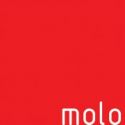
Stephanie Forsythe and Todd MacAllen first revealed molo to the world in 2004. The partners had founded molo the year before on ideas of flexible design, sustainability, and materials research. These ideas informed and continue to inspire their design development of the soft collection, an award-winning line of flexible space partitions, furniture, and lighting elements. Made from FSC® Certified paper or recyclable polyethylene textile, elements can compress, stretch, and connect to completely transform living and working environments.
Rather than introducing new products in an endless cycle, Forsythe and MacAllen focus on iterative development. Their materials research, as well as a sensitivity to nature and light, influence refinements and additions to the collection and inform decisions for finishes, limited editions, or colour options. As part of these ongoing explorations, molo has introduced forest green textile as a new standard colour for the soft collection.
This colour draws inspiration from the natural beauty surrounding molo’s Vancouver studio + workshop. The pleated surface of softwall abstracts the range of vibrant greens and deep shadows found in the Pacific Northwest rainforest into a plurality of vertical lines. As in nature, the structural lines of softwall follow a pattern that adapts and changes in response to the surrounding environment. As lighting conditions shift, an array of hues is revealed within the pleats—conjuring the sensation of passing through an ancient forest full of variegated colour, where shadows take on deep, rich blacks or lichens and leaves shine under sunlight.
softwall + softblock is a modular system of flexible space partitions. Elements are stackable and come in standard heights ranging from 1 to 10 feet tall (30.5 to 305 centimetres). Each softwall is flexible in length, opening to a maximum extension of 15 feet (4.5 meters) or shorter lengths as required. You can create longer partitions by easily connecting two or more softwalls via their magnetic end panels. When a softwall is compressed for shipping or storage, it is less than 2.5 inches (5 centimetres) thick.
As a sustainable building system, the soft collection takes the design process one step further, offering a contemporary set of tools and building blocks to create with. The collection empowers people to rethink and redefine their environments with flexibility and ease. From a loft, to an experiential exhibition, to an entire campus—how will you shape your spaces?
Designed by Stephanie Forsythe and Todd MacAllen for molo.
The Design Process
All molo products are designed by Stephanie Forsythe and Todd MacAllen. Forsythe and MacAllen introduced these design concepts in 2002 and founded molo to develop and share them with the world. Over the last twenty-two years, the partners' ideas of building lightly, flexibly, and sustainably continue to be refined, recognized, and embraced. softwall, for example, is in the permanent collection of the Museum of Modern Art and was awarded the INDEX Award for Design to Improve Life.
"The foundation of molo’s design ethos is about more than visual aesthetics—it’s rooted in the orchestration of sensory experience.
Every object we create is conceived as a layered encounter—where touch, temperature, sound, light, and even instinctive emotional responses are all active participants in the dialogue between design and space.
We believe our objects should evolve with each user, revealing new dimensions over time. By imbuing a living essence into our designs, we discover how a texture, a shift in acoustics, or the way light filters through material, contributes to our lived experience.
What might shift in our lives if we allowed our senses to lead—if we curated our environments not just for function, but for feeling?"
- Stephanie Forsythe and Todd MacAllen
"The human eye perceives green better than any other colour, and the lack of strain could contribute to its relaxing effects. Green helps students focus in libraries, calms the nervous system in healthcare settings, and reduces stress in office spaces.
As we considered how low-wavelength colours promote restfulness and improve focus, we were intrigued by how forest green, combined with the sound-absorbing structure of our walls and furniture, could mimic some of the benefits of being in a forest environment." - Stephanie Forsythe and Todd MacAllen
Sustainability
Sustainability informs every aspect of the design for softwall + softblock. Adaptable space-making allows for change over time, avoiding material waste and unnecessary construction. The flexible structures can be opened in flowing curves or straight lines and are easily moved or reconfigured, empowering individuals to reshape and redesign their environment without hard materials or tools. Responsible material use is efficient material use. For example, a fully expanded softwall is 99% air but can completely transform a space.
The textile option is water-resistant, nonwoven polyethylene. Both materials are fully recyclable. molo is dedicated to pairing these materials with non-toxic adhesives and inks. Packaging is paper-based and made from 80 to 100% recycled pulp.
Led by Stephanie Forsythe + Todd MacAllen, molo is a design and production studio based in Vancouver, Canada. Balancing between the realms of art, design and architecture, molo products and projects are grounded in space making and range in scale from tea set to museum. The design of molo products stems from Forsythe + MacAllen’s architectural exploration. They are inspired by the concept of smaller, tactile objects having true potency in the experience of a space. By working across a range of sizes, Forsythe + MacAllen discover how furniture can heighten the sense of human scale and experience in architecture, or how furniture and product design benefit from thinking in the larger context of place and space making. Hands-on making has always been fundamental to Forsythe + MacAllen’s design process. Ideas pass from mind to hands to material and back again, ingraining a tactile sense of materiality, construction, space and experience. This process has developed to include experimentation with factory production, in close collaborations with manufacturers. It is a way of working that leads to happy accidents and discoveries, inspiring design improvisation and original thinking. molo’s award-winning soft collection, comprised of flexible space partitions, lighting, seating and table elements exemplifies their exploration of production process and experiential space making. Recognized for poetic beauty and pragmatic innovation, softwall and softseating were acquired by the Museum of Modern Art for their permanent collection. molo and the soft concepts have also been honoured with the prestigious Danish INDEX Award, for design to improve life. Forsythe + MacAllen began working together in 1994 at Architecture school. Constructing a number of houses and small-scale objects, Forsythe + MacAllen won several international competitions for design projects and conceptual ideas, including Grand Prize in the Aomori Northern Style Housing Competition, juried by Tadao Ando and Jean Nouvel. The Aomori submission would later evolve into the waterfront Nebuta House, a museum dedicated to its namesake festival. These early projects and ideas have become molo’s foundations. Since its formation in 2003, molo has assembled a dedicated team and grown into a thriving collaborative design and production studio. Additionally, molo has an extended family of specialized manufactures, consultants and contractors that they work with in a beautiful endeavour to bring imagination to fruition.
.jpg)



